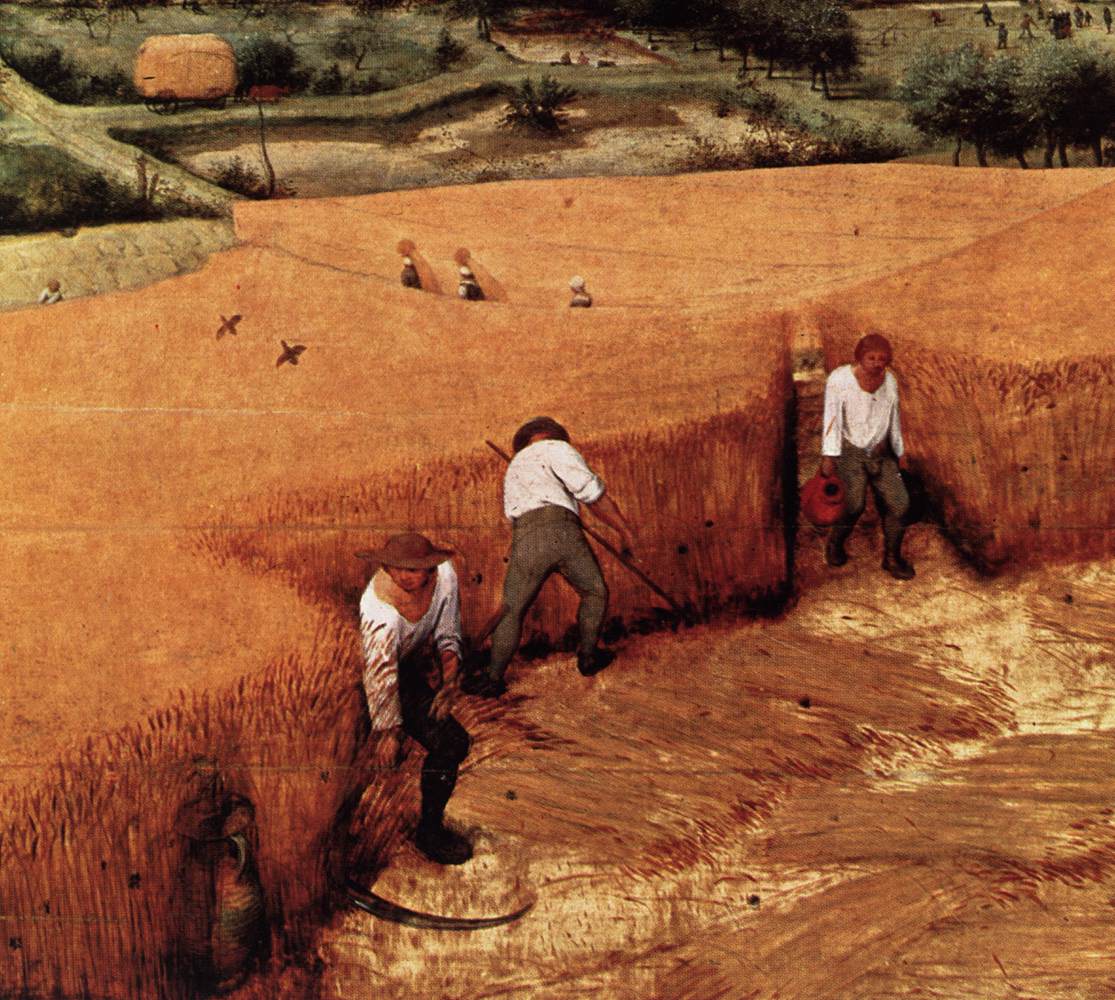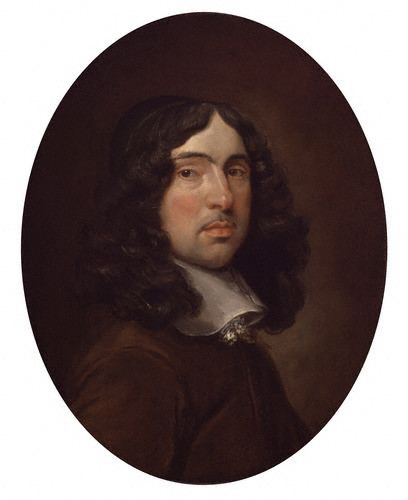.

I am the Mower Damon, known
Through all the Meadows I have mown.
On me the Morn her dew distills
Before her darling Daffadils.
And, if at Noon my toil me heat,
The Sun himself licks off my Sweat.
While, going home, the Ev'ning sweet
In cowslip-water bathes my feet.
What, though the piping Shepherd stock
The plains with an unnum'red Flock,
This Sithe of mine discovers wide
More ground then all his Sheep do hide.
With this the golden fleece I shear
Of all these Closes ev'ry Year.
And though in Wooll more poor then they,
Yet am I richer far in Hay.
Nor am I so deform'd to sight,
If in my Sithe I looked right;
In which I see my Picture done,
As in a crescent Moon the Sun.
The deathless Fairyes take me oft
To lead them in their Danses soft:
And, when I tune my self to sing,
About me they contract their Ring.
How happy might I still have mow'd,
Had not Love here his Thistles sow'd!
But now I all the day complain,
Joyning my Labour to my Pain;
And with my Sythe cut down the Grass,
Yet still my Grief is where it was:
But, when the Iron blunter grows,
Sighing I whet my Sythe and Woes.
While thus he threw his Elbow round,
Depopulating all the Ground,
And, with his whistling Sythe, does cut
Each stroke between the Earth and Root,
The edged Stele by careless chance
Did into his own Ankle glance;
And there among the Grass fell down,
By his own Sythe, the Mower mown.
Andrew Marvell: Damon the Mower (excerpt) from Miscellaneous Poems, 1681
The Corn Harvest (detail): Pieter Bruegel the Elder, 1565 (Metropolitan Museum of Art, New York)
Andrew Marvell: artist unknown, c. 1655-1660: image by Adam sk, 2009

Tom,
ReplyDeleteWhat a beautiful poem this is, Marvell the marvelous mover of every word into exact position in every line, mows me down. . . . Reading this just now (as if for the first time) I'm completely struck by how lovely it all seems to be ("Sun ... licks off my Sweat ... cowslip- water bathes my feet") and also how strangely creepy ("am I so deform'd to sight," "edged Stele by careless chance/ Did into his own Ankle glance). . . . What does it all mean?
5.24
grey whiteness of clouds above shadowed
plane of ridge, quail calling Chi-ca-go
in foreground, sound of wave in channel
suggests “meaning” something
capable in relation to
look of reaction crossed out,
sensed, was meant here
cloudless blue sky reflected in channel,
wingspan of cormorant flapping overhead
It's curious, but yesterday afternoon and today I am involved in mowing the lawn using the fine machine we purchased last year, our first. Each time I mow I proceed more with trepidation than enthusiasm. It's a big solitary adventure for me every time. Reading the final four lines of the Marvell, I'm feeling cautious. I love what Stephen writes: "Marvell the marvelous mover of every word into exact position in every line, mows me down". Wish me luck.
ReplyDeleteCurtis,
ReplyDeleteThis makes you the Mower of the Day, if not also the year and century.
Trepidation, caution, solitary adventure would always apply as well to the reading of Marvell. Luck, I am certain, will be your reward for your perseverance with these highly complicated endeavours.
Steve,
How could I resist the lure of a New Ice Age Bolinasian quail summoning me back to the deep past by calling the name of my home town?
Yes, Marvell's way of moving "every word into exact position in every line" sheers off the top of the head every time, leaving one appropriately decimated by the wonder of a poetics that includes BOTH beauty and extreme import all the time. Plus, there's that "strangely creepy" under-sense you mention, never quite absent from the proceedings -- the look of the fellow in the portrait, concealing more than revealing, perhaps helps a bit with that. Indeed as you say the work constantly refuses to explain itself yet at the same time always
suggests “meaning” something...
Year in and and year out, every time I come back to them, the four marvelous "Mower" poems leave me in awe.
Of this one, Frank Kermode says, "the Mower becomes even more mysterious here... Death is a Mower, and all flesh is grass. Just as the poet himself assumes a quasi-blasphemous martyr pose in Appleton House, and the faun [in Nymph Complaining] is momentarily a Christ symbol, so the Mower (who belongs to the unfallen world) sheds his blood for love..."
And I also appreciate Barbara Everett on Marvell as a great miniaturist and the Mower poems' miraculous construction of "a brilliant toy world that reflects, as in a glass, the reflecting consciousness, perhaps equally small, of the Mower in love, labouring, philosophizing, grieving, scolding, chopping himself down with his own scythe, and always singing as he does it."
Tom,
ReplyDeleteBeautiful -- and there it goes again ("Chi-ca-go Chi-ca-go Chi-ca-go"). I hadn't thought of that (your home town) yesterday (when it first 'appeared'), nor this morning when it did again (since 21st century "mowers" (with chainsaws and a tractor) have been destroying the designated Open Space of the field behind my house here on Overlook for the past four weeks (6 days a week, mind you, large piles of dried brush now stacked up just over there and just out of sight out there), the quails have been running around in the yard here, under the rose bush, making this their new home town, it seems. . . . And now when I hear them call "Chi-ca-go" I'll always think (also) of you. . . .
Many thanks for these and all such further thoughts on Marvell.
Steve,
ReplyDeleteWell, in Upon Appleton House A. M. has one of his Mowers inadvertently catch a bird that had been nesting in the field with his blade -- foreshadowing your "developers"?
(Of course the parable reflects, among other calamities, events of his own time, that bloody civil war which had dragged out over all those years...)
With whistling Sithe, and Elbow strong,
These Massacre the Grass along:
While one, unknowing, carves the Rail,
Whose yet unfeather'd Quils her fail.
The Edge all bloody from its Breast
He draws, and does his stroke detest;
Fearing the Flesh untimely mow'd
To him a Fate as black forebode.
Suggesting that down the line perhaps for those who are massacring your field there will be (symbolic?) hell to pay...
I sent your lines from "Damon the Mower" out to those in our neighborhood group (Friends of Open Space) yesterday, seeing particular 'significance' in these last four lines --
ReplyDeleteThe edged Stele by careless chance
Did into his own Ankle glance;
And there among the Grass fell down,
By his own Sythe, the Mower mown.
As if to foreshadow the stoppage of this work before it's too late? And, lo and behold, it seems the County HAS put a temporary stop to the cutting according to the West Marin Citizen (which has taken its place alongside the Point Reyes Light as local $1.00 paper of choice). Stay tuned. . . .